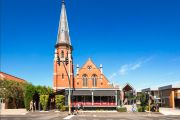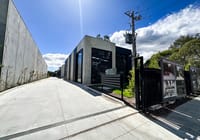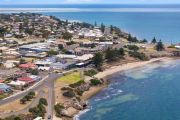
Billions in CBD office tower sales to test valuations
Listed property giants Charter Hall and Dexus have quietly put billions of dollars worth of CBD office towers up for sale, in one of the biggest tests for a market that all but shut down as flexible work took hold and interest rates soared, sending valuations lower.
Charter Hall, Dexus and other big landlords have been keen to recycle capital through their real estate portfolios, to develop a new generation of blue-chip towers to win corporate tenants.

The slew of assets now being offered off-market comes as their owners gain confidence that the office sector disruption is finally bottoming out.
Charter Hall chief executive David Harrison said interest in office assets had re-emerged at the start of the year and the pool of interested buyers had grown compared with last year.
“I think the gap if you like, what they call the bid-ask spread, between vendor expectations and buyer expectations is closing,” he told The Australian Financial Review.
The flow of big office deals had dwindled to a trickle over the past 18 months as the bid-ask spread ballooned and prospective buyers and sellers were in a stand-off regarding valuations.
Higher interest rates pushed up the risk premium required from commercial real estate, whose returns are typically viewed as a bond proxy by investors. As those sought-after yields followed interest rates and bond yields higher, and as rents flatlined, building values effectively fell.
Major landlords have written down book values by as much as 15 per cent in the past year, and some analysts have said valuations could fall as much as 25 per cent before the bottom is reached.
Mr Harrison cited the recent sales of prominent Sydney towers at 60 Margaret Street and 44 Market Street – both were sold at discounts to their peak values – as signs that the office market was finally beginning to thaw.
“I think there’s going to be more office transaction volume announced over the next few months, which is just showing that liquidity is increasing in the office market,” he said.
“In every cycle I’ve been through, most of the time there’s a gap between what sellers want and what buyers want. And ultimately, that gap closes as liquidity increases, and that’s what we’re seeing now.”
At least four Charter Hall A-grade assets were undergoing off-market processes across the Sydney, Melbourne and Adelaide CBDs, according to industry sources. These include 231 Elizabeth Street and 333 George Street in Sydney, 200 Queen Street in Melbourne and 121 King William Street in Adelaide.
Mr Harrison said that although those assets were “not on the market” as such, the listed property giant had held discussions with prospective buyers who had shown interest in them.
Recycling capital into new projects
He said the off-market campaigns of some offices were aimed at recycling capital into new projects such as Charter Hall’s coming $1.8 billion Chifley South development. None of the off-market processes were being done to fund redemptions for its flagship office fund.
“There are no redemptions for CPOF [Charter Hall Prime Office Fund],” he said.
“We don’t have anything formally for sale. It’s public knowledge that we ran an off-market campaign for 333 George Street. Part of our rationale was that we’re building a second Chifley tower so we’re increasing the scale of our core Sydney CBD exposure quite significantly,” he said.
Market sources have suggested that 11-33 Exhibition Street in Melbourne is another asset mooted for a potential divestment, but Mr Harrison said that asset was not for sale.
The move to include higher-grade CBD towers represents a shift from the start of the year, when Charter Hall was testing the waters with lower-grade assets such as Jessie Street Centre, located in western Sydney.
The book value of 333 George Street was about $200 million in December last year. Sources familiar with Charter Hall said the combined value of the office assets offered off-market would run into billions of dollars.
ASX-listed Dexus has also been seeking interest in office towers worth about $2 billion, based on their book values in December last year.
These include Dexus’ stake in the premium-grade office tower at 5 Martin Place, in the heart of the Sydney CBD’s core precinct. Its 25 per cent interest in that building is worth about $175 million.
Other Dexus office towers being sounded out include 175 Pitt Street ($311 million) and 30 The Bond ($324 million) in Sydney’s CBD and 385 Bourke Street ($355 million) in Melbourne’s CBD.
Higher-grade offices outside the CBD include 100 Mount Street in North Sydney ($375 million). Lower-grade assets that were also informally available included 100 Harris Street in Sydney’s CBD fringe ($284 million) and 101 George Street ($88.5 million) in western Sydney.
“We currently have several processes under way,” a Dexus spokesman said. “Dexus balance sheet remains focused on capital recycling to enhance portfolio composition and provide capacity for growth initiatives.”
Deals on smaller offices
The two listed property giants are testing the waters for interest in major assets at a time when a growing number of syndicators are making deals on smaller offices.
Recent small syndicator deals include Brisbane-based fund manager Exceed Capital’s purchase of a $37 million Brisbane office tower from Centuria and former CBRE research analyst Jacob Fong’s acquisition of a B-grade office tower in the same city from the Uniting Church.
MSCI’s regional research chief, Benjamin Martin-Henry, said the decision by office owners to begin offering their better assets to the market was a positive sign.
It was probably a signal that values were closer to bottoming out compared with 18 months ago. Such assets were more likely to be sold closer to the asking price at this point in the cycle, Mr Martin-Henry said.
“The better quality assets will trade at closer to book value than the poorer quality assets. So I think sellers are now having a bit more confidence that they can put their quality assets on the market and get a decent price for them,” he said.
Transaction volumes for the first quarter were down 36 per cent compared with the sluggish first quarter last year, according to MSCI. The market recorded just $5.7 billion in acquisitions, marking the sixth consecutive quarter of year-on-year declines.











